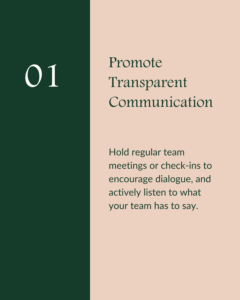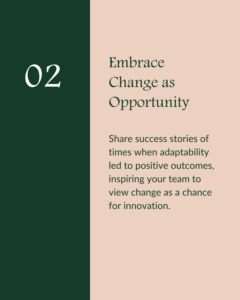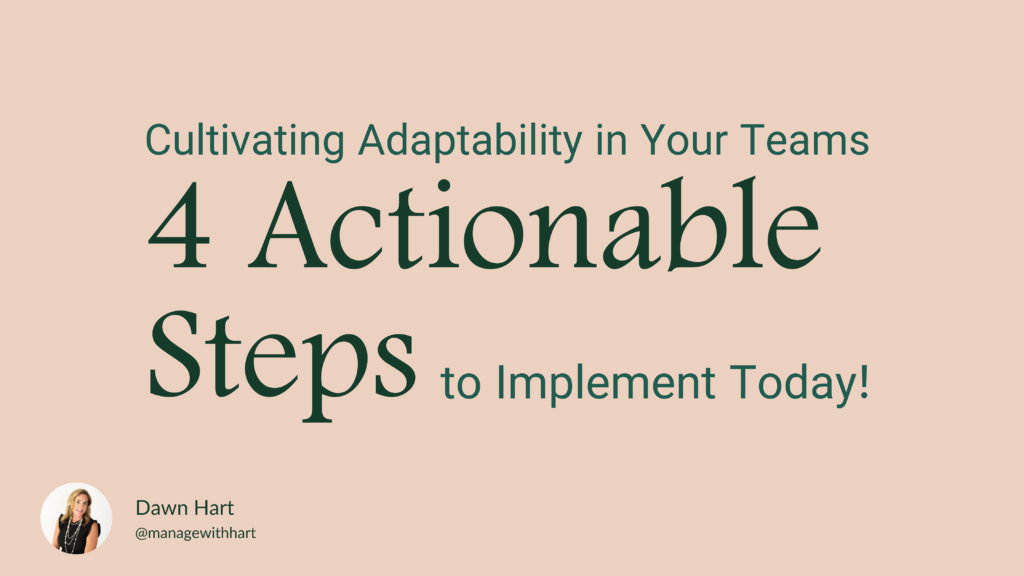As leaders within our organizations, we’ve all experienced the whirlwind of change and uncertainty that comes with managing a department. From market fluctuations to unexpected disruptions, the ability to adapt quickly is not just a valuable asset – it’s a necessity for success.
But how do we foster a culture of adaptability within our teams? How do we encourage open communication and flexibility, ensuring that everyone is equipped to navigate the ever-shifting landscape of today’s corporate world?
Here are four actionable steps to get started:
Promote Transparent Communication
 Foster an environment where team members feel comfortable sharing their ideas, concerns, and feedback openly.
Foster an environment where team members feel comfortable sharing their ideas, concerns, and feedback openly.
Transparent communication is the cornerstone of a resilient and adaptable team. When team members feel safe to voice their ideas and concerns openly, it fosters trust and collaboration.
Hold regular team meetings or check-ins to encourage dialogue, and actively listen to what your team has to say. Consider implementing tools or platforms for anonymous feedback to ensure everyone’s voice is heard.
Embrace Change as Opportunity
 Lead by example by demonstrating a positive attitude towards change and embracing it as an opportunity for growth.
Lead by example by demonstrating a positive attitude towards change and embracing it as an opportunity for growth.
Change is inevitable in today’s dynamic business environment, but it’s how we respond to change that determines our success. By embracing change as an opportunity for growth and innovation, teams can stay ahead of the curve and thrive in the face of uncertainty.
Encourage your team to approach challenges with a problem-solving mindset, focusing on solutions rather than dwelling on setbacks. Share success stories of times when adaptability led to positive outcomes, inspiring your team to view change as a chance for innovation.
Provide Continuous Learning Opportunities
 Invest in professional development and training programs tailored to your team’s needs and goals.
Invest in professional development and training programs tailored to your team’s needs and goals.
Continuous learning is essential for building a workforce that is adaptable and future-ready. By providing opportunities for ongoing learning and growth, leaders empower their teams to navigate challenges with confidence and agility.
Offer workshops, seminars, or online courses to help team members acquire new skills and stay updated on industry trends. Encourage cross-training and knowledge sharing among team members to build a versatile and well-rounded workforce.
Lead by Example
 Be a role model for adaptability by demonstrating resilience and flexibility in your own approach to work.
Be a role model for adaptability by demonstrating resilience and flexibility in your own approach to work.
Leadership sets the tone for organizational culture, and leading by example is crucial for fostering adaptability within teams. By demonstrating resilience and flexibility in their own approach to work, leaders inspire confidence and trust in their teams.
Show your team that you’re willing to pivot and adjust to changing circumstances, and encourage them to do the same. Celebrate small wins and milestones along the way, reinforcing the importance of adaptability in achieving success.
Navigating Change with Confidence
In a rapidly evolving corporate landscape, adaptability isn’t just a buzzword – it’s the key to long-term success. By fostering a culture of adaptability within your teams, you empower them to navigate challenges with confidence and creativity, ensuring that your organization remains agile and resilient in the face of uncertainty.
At Manage With Hart, we understand the challenges of navigating change and creating an adaptable culture within organizations. With our expertise in leadership development and team empowerment, we provide tailored solutions to help companies build resilient teams that thrive in dynamic environments. From leadership coaching to team training programs, we’re here to support you every step of the way on your journey to success.
Ready to cultivate adaptability in your team? Schedule a consultation with us today to learn how we can help you build a resilient and adaptable workforce.

